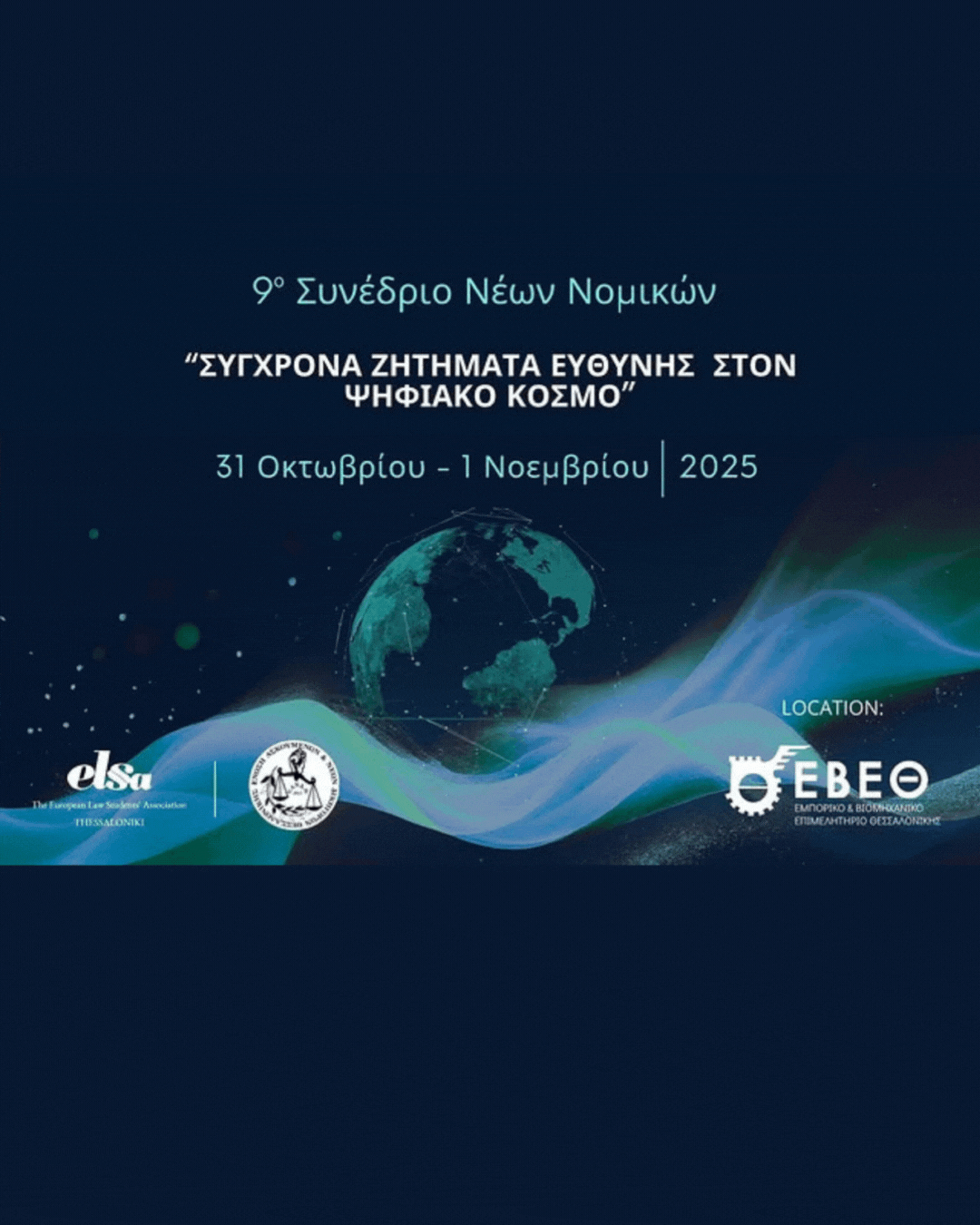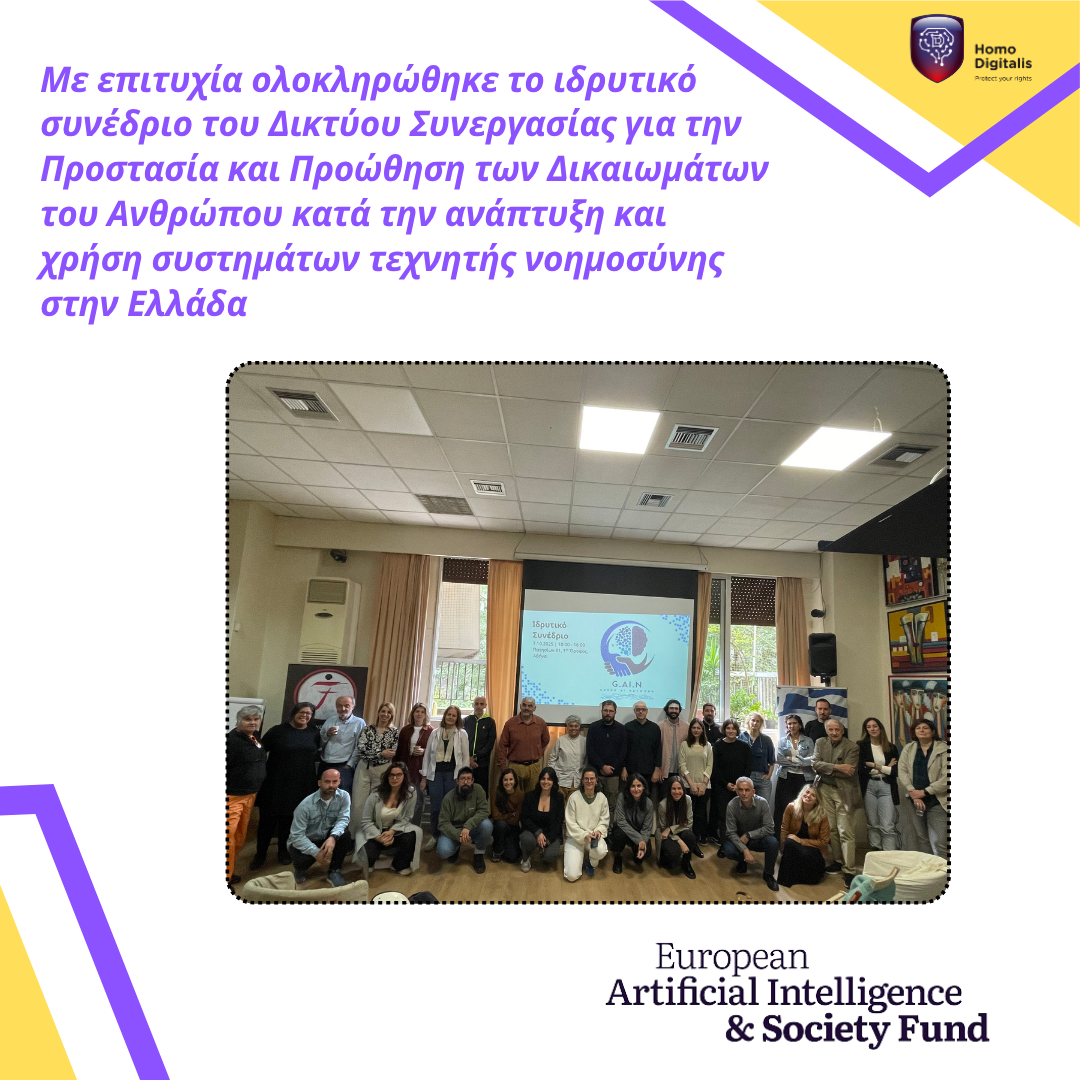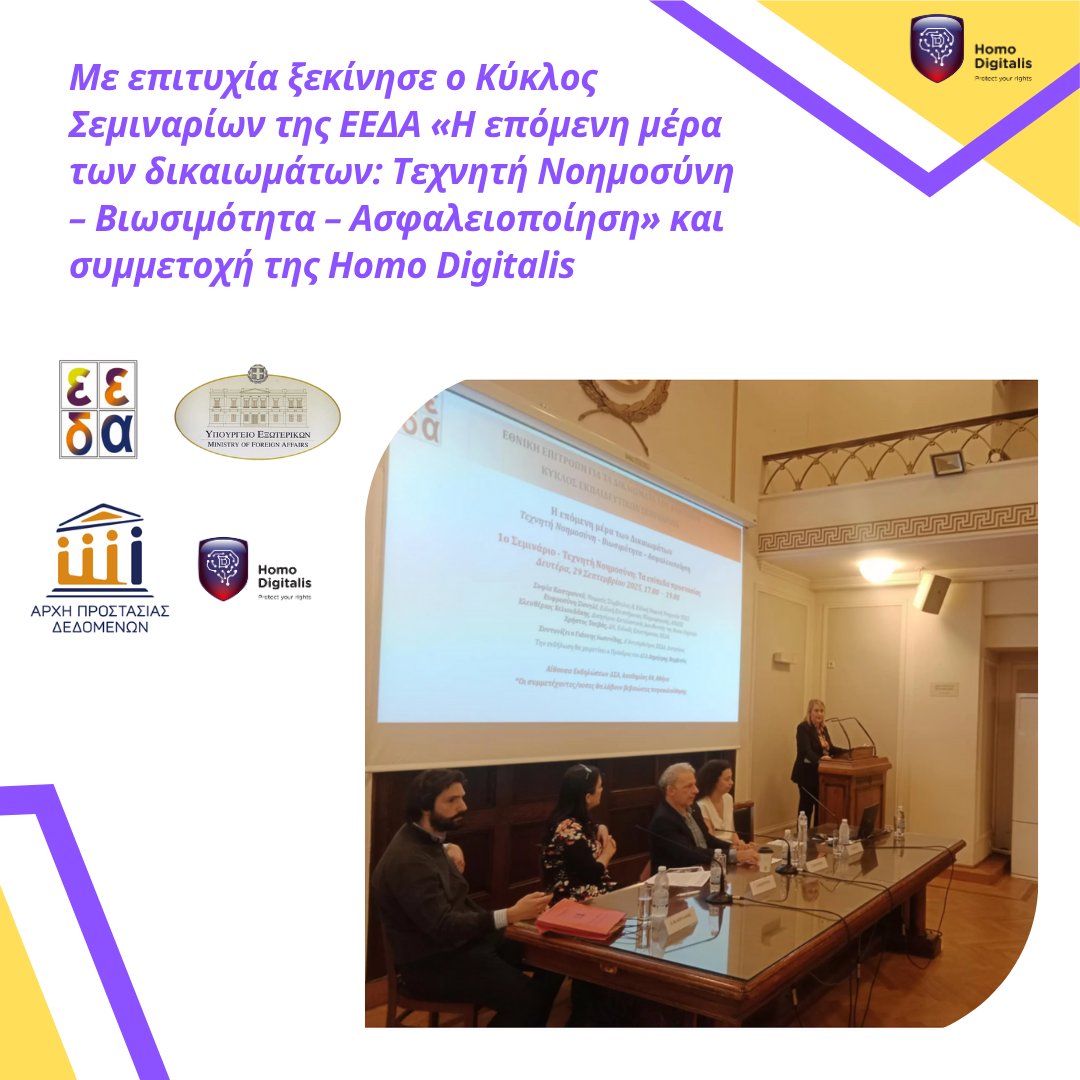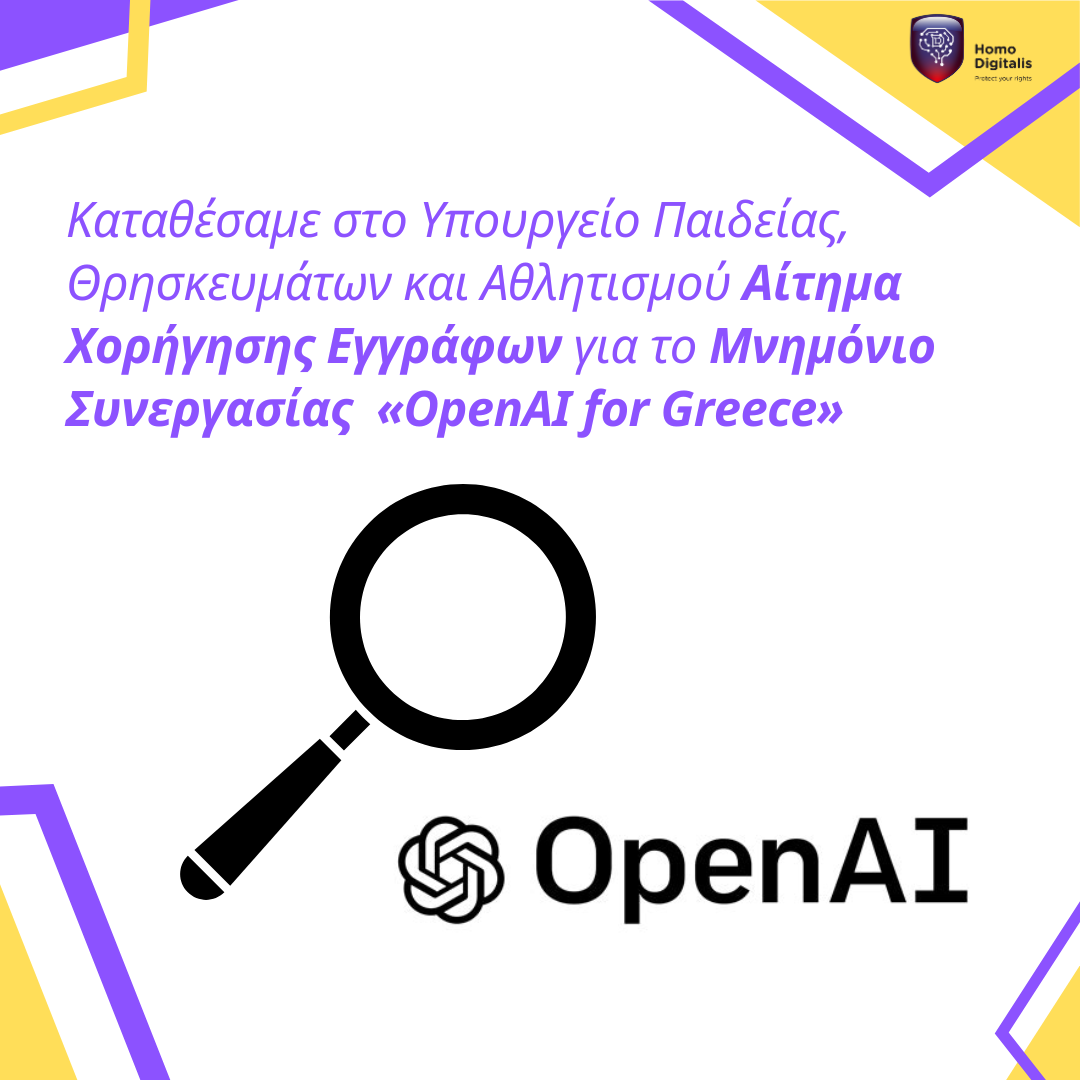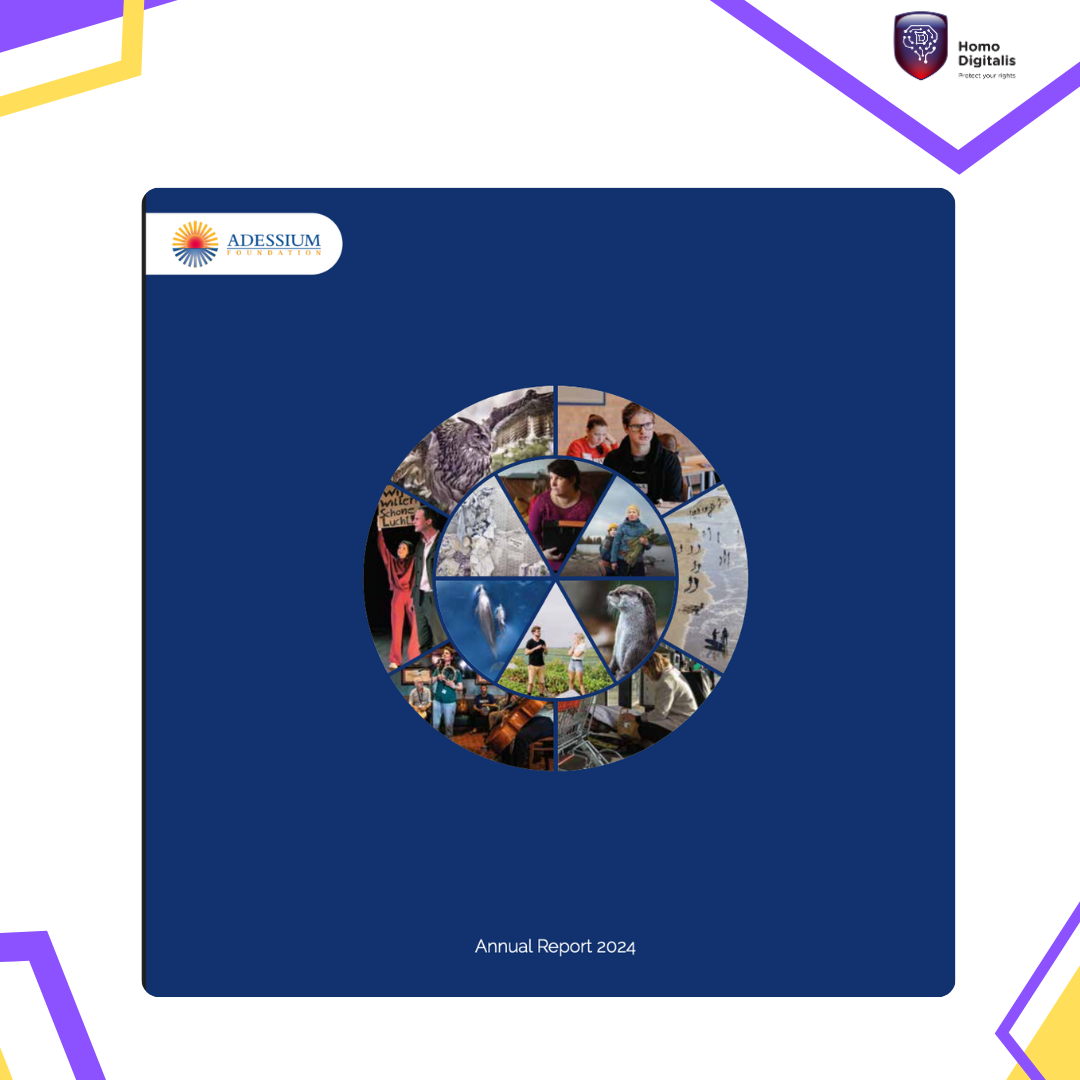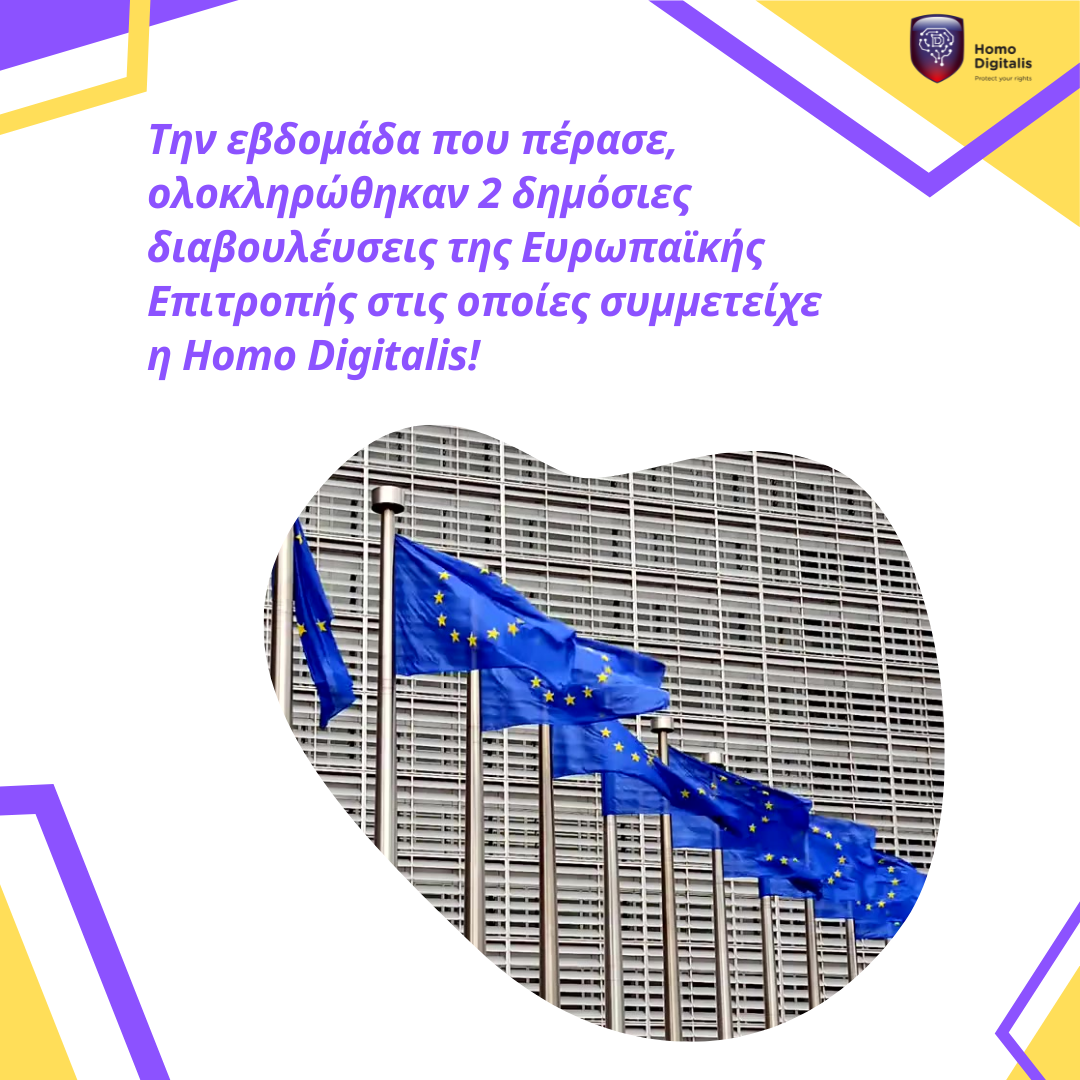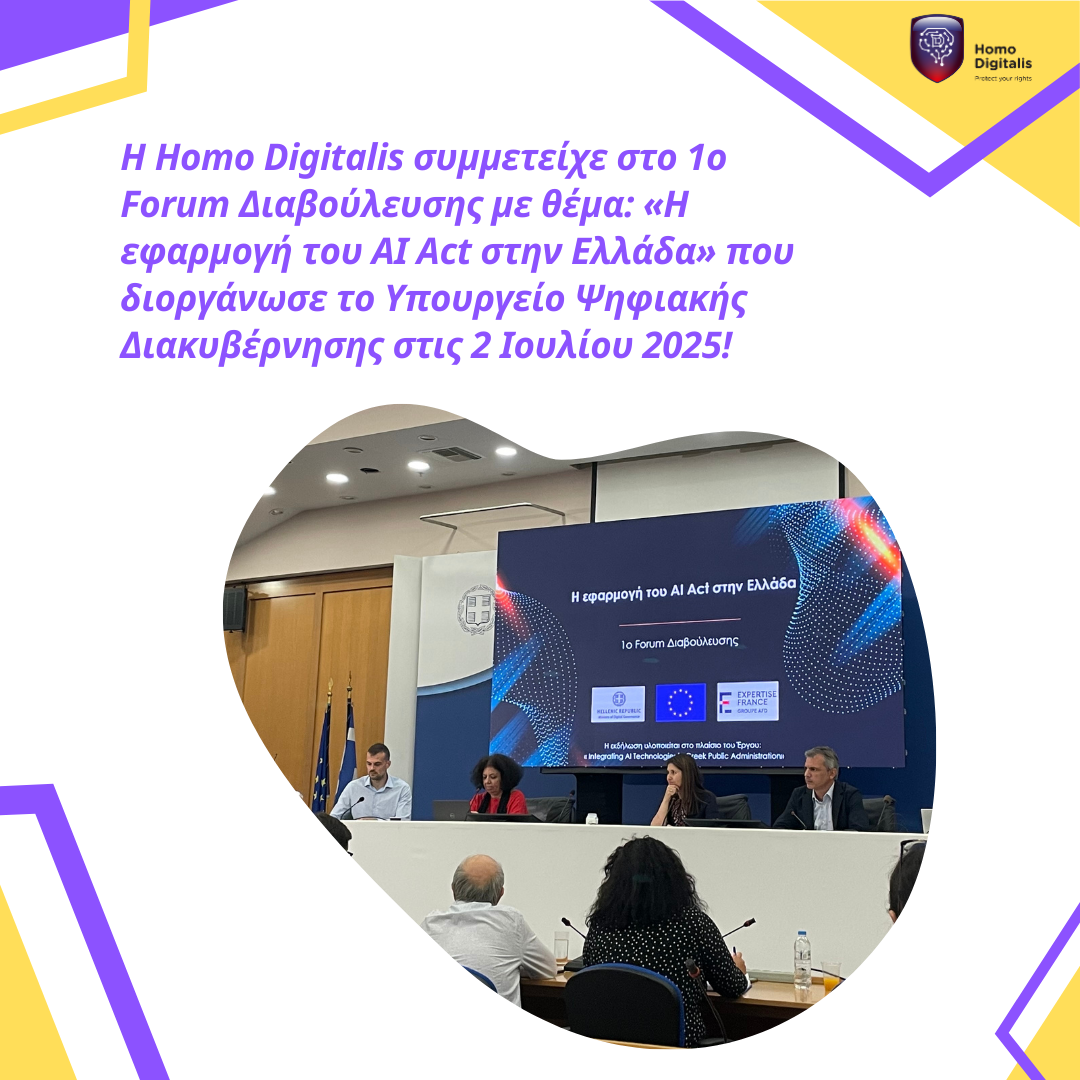Speech by Homo Digitalis at the 9th Conference of Young Lawyers in Thessaloniki
ELSA Thessaloniki and the Association of Trainee and Young Lawyers of Thessaloniki (EANDiTh) are organizing the 9th Conference of Young Lawyers today and tomorrow at the Thessaloniki Chamber of Commerce and Industry.
It is a great honor for Homo Digitalis to participate in this event, and we sincerely thank the organizers for their kind invitation.
More specifically, tomorrow, November 1, from 10:45 to 12:15, during the first panel of the day entitled “Contemporary Issues of Liability in the Digital World,” our member Melina Skondra will speak.
She is a Lawyer admitted to the Supreme Court, DPO, CIPP/E, and holds an MSc in Law & Informatics (University of Macedonia), with unique specialization in relevant fields.
The title of her presentation is “GDPR & Compensation.”
The line-up of the other speakers includes:
Spiros Tassis, POTAMITISVEKRIS (TMT, Data & IP), Chairman of the Hellenic Data Protection and Privacy Association, and Member of the Board of the European Federation of Data Protection Officers (EFDPO)
Athanasios-Antonios Leontaris, Lawyer / Legal Counsel and Industry Fellow at the Institute for the Future, University of Nicosia
Pavlos Salonikidis, Lawyer admitted to the Courts of Appeal, holder of an LL.M. in International and European Legal Studies, Faculty of Law, Aristotle University of Thessaloniki
We look forward to seeing you there!
Speech by Homo Digitalis at an event of the Global Shapers Thessaloniki Hub on AI
It is a great pleasure for Homo Digitalis to participate in the Global Shapers Thessaloniki Hub event series, “Coffee with Shapers”!
The theme of the event is AI & Human Rights and it will take place on Saturday, November 1, 2025, from 16:30 to 20:00, at OKTHESS.
Homo Digitalis will be represented by our members Evi Fotopoulou and Dimos Kostoulas.
Admission is free, and the registration form is available here.
We would like to warmly thank the organizing team and Emily Fisher for the kind invitation!
The Founding Conference of the Greek Artificial Intelligence Network – GAIN Successfully Concluded
The founding conference of the Cooperation Network for the Protection and Promotion of Human Rights in the Development and Use of Artificial Intelligence Systems in Greece was successfully completed! The provisional title of the network is Greek Artificial Intelligence Network – GAIN.
The network aspires to become a space for collaboration, knowledge exchange, and mutual support, fostering initiatives in awareness-raising, advocacy, and legal assistance — with the central goal of safeguarding Human Rights in the development and use of Artificial Intelligence systems.
The network’s activities aim to go beyond the minimum legal guarantees, drawing guidance from codes of ethics that emphasize morality, transparency, and accountability in the design, implementation, and evaluation of AI technologies.
The event took place on October 7, 2025, hosted at the offices of the Greek Forum of Migrants, where members and observers of the network had the opportunity to discuss, plan, and lay the foundations for an open, collaborative, and socially responsible AI community in Greece.
During the event, Open Lab Athens delivered an educational presentation on the technical characteristics and materialities of machine learning, significantly contributing to the discussion and collective understanding of the related technologies and their limitations.
The initiative is coordinated by the Homo Digitalis team, with the support of the European Artificial Intelligence & Society Fund (EAISF).
You can read the related Press Release (ΕL) here.
Organizations participating in the network’s processes as members or external observers include (in alphabetical order):
Ανοιχτό Εργαστήριο Αθήνα | Open Lab Athens
Διεπιστημονική Εταιρία Έρευνας στην Αιματολογία – ΔΕτΕΑ
Δίκτυο για τα Δικαιώματα του Παιδιού | Network for Children’s Rights
Ε.Κ.ΠΟΙ.ΖΩ.Ένωση Καταναλωτών «Η Ποιότητα της Ζωής» | Consumers’ Association “The Quality of Life” EKPIZO
Ελληνική Ένωση Δικαιωμάτων του Ανθρώπου | Hellenic League for Human Rights
ΕΛΛΗΝΙΚΟ ΣΥΜΒΟΥΛΙΟ ΓΙΑ ΤΟΥΣ ΠΡΟΣΦΥΓΕΣ | GREEK COUNCIL FOR REFUGEES
Ελληνικό Φόρουμ Μεταναστών | Greek Forum of Migrants
Εταιρεία Περιφερειακής Ανάπτυξης και Ψυχικής Υγείας – ΕΠΑΨΥ | Association for Regional Development and Mental Health – EPAPSY
Ένωση Πληροφορικών Ελλάδος
Ινστιτούτο Έρευνας Ρυθμιστικών Πολιτικών – ΙΝΕΡΠ | Institute for Regulatory Policy Research – INERP
Κέντρο ΔΙΟΤΙΜΑ
ΚΥΤΤΑΡΟ ΕΝΑΛΛΑΚΤΙΚΩΝ ΑΝΑΖΗΤΗΣΕΩΝ ΝΕΩΝ – ΚΕΑΝ | CELL OF ALTERNATIVE YOUTH ACTIVITIES
Με Άλλα Μάτια | Me Alla Matia
Οργανισμός Ανοιχτών Τεχνολογιών – ΕΕΛΛΑΚ | Open Technologies Alliance (GFOSS)
ΠΑΡΑΤΗΡΗΤΗΡΙΟ ΑΣΤΥΝΟΜΕΥΣΗΣ copwatch.gr
AMKE REVMA – ROMA EDUCATIONAL VOCATIONAL MAINTAINABLE ASSISTANCE
Athens Network of Collaborating Experts -ANCE
DATAWO
ERGO.Academy
HIAS Greece
Homo Digitalis
I Have Rights
In contACT
inside story.
KnowledgeRights21 (National coordinator for Greece and Cyprus)
OmniaTV (iCase Κοιν.Σ.Επ.)
Reporters United
SolidarityNow
Solomon
VISIBLE MACHINES
Vouliwatch
WHEN Equity Empowerment Change
WWF Greece
Homo Digitalis speaks at the 1st Seminar of the GNCHR Educational Seminar Series on “Artificial Intelligence: Levels of Protection”
With great success and active public participation, on Monday, September 29, 2025, the opening event of the Educational Seminar Series of the Greek National Commission for Human Rights (GNCHR) took place in the event hall of the Athens Bar Association (DSA), under the theme:
“The Next Day of Rights: Artificial Intelligence – Sustainability – Securitization.”
Homo Digitalis had the great honor of contributing with a presentation in the first seminar of the series, titled “Artificial Intelligence: Levels of Protection.”
Opening remarks were delivered by Marinetta Gounari–Chatzisarantou, Vice President of the Athens Bar Association, while the event was moderated by Giannis Ioannidis, First Vice President of the GNCHR.
Speakers at the seminar included, in order:
Sofia Kastranta, Senior Legal Advisor, Special Legal Service of the Ministry of Foreign Affairs
Dr. Efrosini Siougle, Expert Scientist in Informatics, Head of the Advisory and Compliance Mechanisms Department of the Hellenic Data Protection Authority
Eleftherios Chelioudakis, LL.M, M.Sc, Lawyer and Executive Director of Homo Digitalis
Dr. Christos Tsevas, Expert Scientist of the GNCHR
We warmly thank the Greek National Commission for Human Rights for the kind invitation to participate!
You can watch the full event here.
The second seminar will take place at the Athens Bar Association on Monday, October 13, from 17:00 to 19:00, on the topic: “Artificial Intelligence: Rights.”
Find more information here.
We submitted a FOIA before the Greek Ministry of Education for its Memorandum of Cooperation with OpenAI
At Homo Digitalis, we support the innovations brought by new technologies and believe that they can significantly contribute to the improvement of our society, provided that their use complies with the applicable legal framework and aims to promote and protect our rights and freedoms. We envision a better world, where the adoption of technological solutions is the result of critical thinking as well as informed and balanced decision-making.
In this light, we were concerned by the signing, on Friday, September 5, of the “OpenAI for Greece” Memorandum of Cooperation by the Ministry of Education, Religious Affairs and Sports with OpenAI and other stakeholders, for the pilot use of the ChatGPT Edu tool by teachers and students in 20 high schools across the country.
How will teachers and students feel when asked to use tools provided by a company such as OpenAI, which has already been fined €15 million for violations of data protection legislation in Italy and is currently under investigation for possible violations in other countries, such as Austria?
And on what grounds are Artificial Intelligence systems based on proprietary software from US tech giants being prioritized over equivalent tools that could be developed with free and open-source software by research centers and institutions in Greece? Such a choice disregards the European Union’s strategy to strengthen openness, transparency, and technological sovereignty, and, in the case of widespread adoption, will inevitably lead to the dependency of our education system on proprietary software and foreign companies.
In light of the above, today we submitted (protocol number 108260/8/92025) before the Ministry of Education, Religious Affairs and Sports a request for access to documents and information, in which we set out our concerns in detail and request access both to the Memorandum of Cooperation and to other related legal deliverables that should have been drawn up regarding the obligations arising from Law 4624/2019 and Law 4961/2022.
You can see our request here (EL).
Homo Digitalis is featured in Adessium's Annual Report for 2024
Adessium supports the European AI & Society Fund (EAISF), a pooled fund dedicated to achieving responsible AI policies and applications. The fund works on legislation for artificial intelligence, monitors its social impact and reports potential risks, such as unjust consequences for citizens and environmental damage due to technology.
In this context, Homo Digitalis alongside European Digital Rights were featured in the 2024 Annual Report, highlighting our key achievements and ongoing work made possible through the support of EAISF. The report includes quotes from Claire Fernandez and Eleftherios Chelioudakis.
We warmly thank EAISF and Adessium for the opportunity to showcase our impactful work in the field of border management and law enforcement, as well as for their continuous support in safeguarding human rights in the digital age!
Read their full annual report and the important work they support here.
We spoke to POLITICO about our work in the field of Artificial Intelligence
Homo Digitalis spoke to Ellen O’Regan and POLITICO Europe for our actions in the field of border management next to prominent academics (Niovi Vavoula & Derya Ozkul), civil society organisations (European Digital Rights, Chloé Berthélémy Border Violence Monitoring Network, Pauline Fritz and Equinox: Racial Justice Initiative, Sarah Chander), EU Bodies & Agencies (European Commission, Europol, Claire Georges, Frontex) and the hashtag#Hellenic hashtag#DPA!
Our Executive Director Eleftherios Chelioudakis, LL.M, M.Sc, represented us in this interview.
According to the article, the Hellenic DPA “wants to wrap up two long-running investigations this September, one into the Greek police’s use of portable face and fingerprint scanning tools, and another into the Greek coast guard’s adoption of social media monitoring software.” We are glad to hear that important progress has been made in these two cases initiated by Homo Digitalis and its allies, researcher Phoebus Simeonidis (omniatv), HIAS Greece, Hellenic League for Human Rights, and Privacy International.
Many thanks to the journalist for her interest in our work! Read the full article here.
Homo Digitalis contributes to two EU consultations on the Data Strategy and high-risk AI systems
Last Friday, July 18th, Homo Digitalis submitted detailed input to two public consultations launched by the European Commission.
The first consultation focused on collecting targeted input from stakeholders regarding the implementation of the AI Act (2024/1689) rules for high-risk AI systems. According to Article 6(5) of the AI Act, the Commission must publish guidelines on the practical implementation of the high-risk classification rules by February 2, 2026, accompanied by a list of practical examples of both high-risk and non-high-risk AI systems. Additionally, Article 96(1)(a) requires the Commission to provide guidelines on the application of obligations and responsibilities for high-risk AI systems, including those across the AI value chain, as defined in Article 25. In its submission, Homo Digitalis provided practical examples of AI systems from Greece and other countries, and highlighted key issues that should be clarified in both the classification and compliance guidelines.
The second consultation addressed the EU Data Strategy. Its three goals are to: 1) boost investment in data technologies and promote data sharing through voluntary or funded initiatives; 2) streamline existing rules and develop data tools to reduce administrative burdens; and 3) shape an international data strategy that ensures safeguards for data transfers outside the EU and encourages data inflows into the EU.
In its response, Homo Digitalis raised strong concerns about potential undermining of personal data protection under the pretext of simplification, flexibility, and competitiveness. The organisation reaffirmed its position that fundamental rights must be strengthened through the use of new technologies and rejected the framing of existing legal frameworks as a barrier to innovation. According to Homo Digitalis, the challenges lie primarily in the lack of enforcement and resources, not the laws themselves.
You can read our full submission for the first consultation here.
We thank the drafting team, Stavrina Chousou, Niki Georgakopoulou, Sofia Antonopoulou, and Eleftherios Chelioudakis, for their valuable contributions.
You can read our full submission for the second consultation here, edited by our Executive Director, Eleftherios Chelioudakis.
Homo Digitalis Participates in the 1st Consultation Forum of the Ministry of Digital Governance on the AI Act
On July 2, 2025, Homo Digitalis participated in the 1st Consultation Forum titled: “The Implementation of the AI Act in Greece”, organized by the Ministry of Digital Governance and Expertise France.
The event was held in the context of the TSI Technical Support action “Integrating AI Technologies in the Greek Public Administration”, funded by the European Commission (SG REFORM). Its aim was for the Ministry to gather valuable information, exchange views with stakeholders, explore best practices, challenges, and prospects, and present its proposal for the implementation of the AI Act and AI governance in the country.
Homo Digitalis was invited to participate in the roundtable discussion of the thematic session “Artificial Intelligence in the Public Sector”, which focused on the challenges and opportunities of implementing AI systems by public sector entities in Greece.
During the event, we submitted our written views on the questions raised in the thematic session to the Ministry, distributed copies of our statements to relevant decision-making bodies, and presented them orally as part of our contribution during the roundtable discussion.
We sincerely thank the organizers and speakers of the event for including us and giving us the opportunity to share our positions! Homo Digitalis was represented by Eleftherios Chelioudakis, Co-founder and Executive Director of Homo Digitalis, who also is the editor our statements.
You can view our written positions here (in EL).
